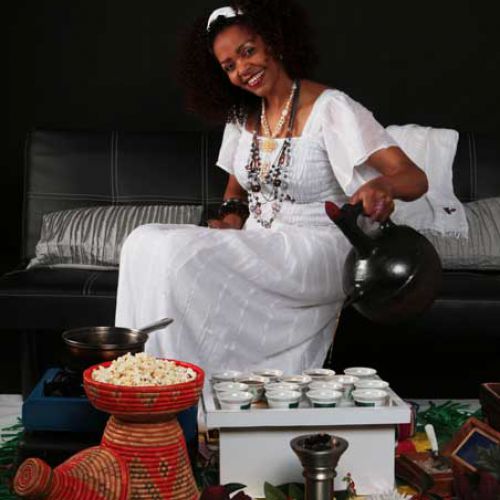
Ethiopian culture - coffee
The coffee ceremony is set up around a "rekbot" - a shelf-like box furniture that serves as the staging platform for the coffee making. The roasting of the coffee beans is done in a flat pan over a tiny charcoal stove, or a gas stove if necessary, the rich, nutty smell mingling with the heady aroma of frankincense and myrrh that is always burned during the ceremony. The hostess gently washes a handful of coffee beans on the heated pan, then stirs and shakes the husks away. When the coffee beans have turned black and shining and the aromatic oil is coaxed out of them, they are passed around the room for people to smell, and then are ground by pestle and mortar.
Ethiopian’s coffee ceremony is an integral part of their social and cultural life. The coffee ceremony takes place three times a day (Morning, noon and evening. Performing the ceremony is almost obligatory in the presence of a visitor, whatever the time of day. Don't be in a hurry though - this special ceremony can take a few hours. So sit back and enjoy because it is most definitely not instant!
Ethiopian homage to coffee is sometimes ornate, and always beautifully ceremonial. The ceremony is usually conducted by one you women dressed in traditional Ethiopian costume of white dress with coloured woven borders. The roasting of the coffee beans is done in a flat pan over a tiny charcoal stove, the pungent smell mingling with the heady scent of incense that is always burned during the ceremony. The lady who is conducting the ceremony gently washes a handful of coffee beans on the heated pan, then stirs and shakes the husks away. When the coffee beans have turned black and shining and the aromatic oil is coaxed out of them, they are ground by a pestle and a long handled mortar. The ground coffee is slowly stirred into the black clay coffee pot locally known as 'jebena', which is around at the bottom with a straw lid. Due to the archaic method used by Ethiopians, the ground result can be called anything but even, so the coffee is strained through a fine sieve several times. Coffee holds a sacred place in their country -just the growing and picking process of coffee involves over 12 million Ethiopians and produces over two-thirds of the country's earnings. The best Ethiopian coffee may be compared with the finest coffee in the world, and premium washed Arabica beans fetch some of the highest prices on the world market.
